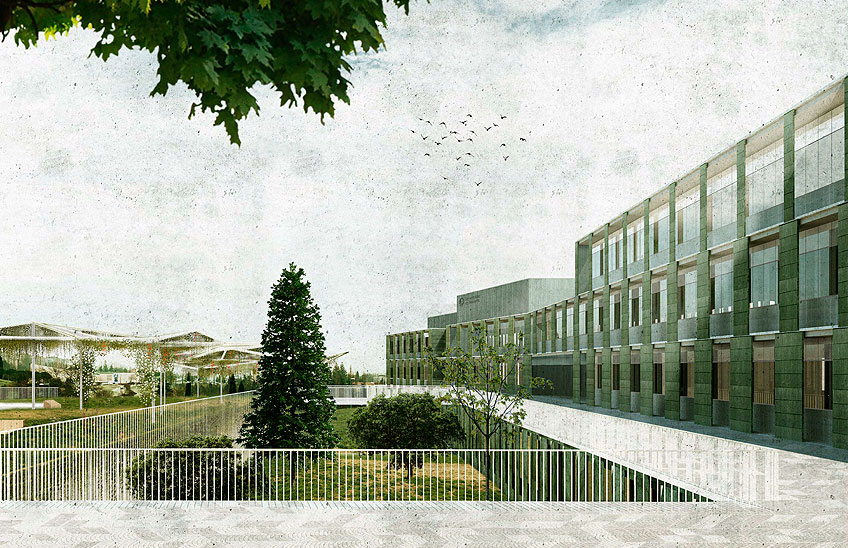The University promotes collaborative innovation to face the challenges of the Economics circular
More than 50 multidisciplinary experts analyze the challenges of the industrial, economic and environmental transition to this model of sustainable production and consumption

FotoManuelCastells/In the center, from left to right, Delia Sola, Paloma Grau and Javier Santos, together with the speakers (in the first row) and the workshop attendees.
28 | 05 | 2025
The University of Navarra celebrated the workshop Time to Share: Economics Circular , a meeting multidisciplinary that brought together more than 50 researchers, technicians and representatives of the public administration , to share sustainable solutions to the environmental, industrial and economic challenges of the current productive development model .
Organized by the BIOMA Institute Institute and the Office of the Vice President for Research and Sustainability of the University, the workshop stood out for its cross-disciplinary and collaborative approach . Paloma Grau, Vice President for research and Sustainability, opened the event by stressing the importance of "bringing together knowledge from different disciplines to promote research that translates into real innovations with local and European impact".
Circular Economics : a strategic opportunity for Navarra
CircularEconomics represents a core topic opportunity for Navarra, especially because of the weight of the industrial sector in its GDP. "Navarre's industry represents approximately 31% of the regional GDP, placing us above the national average . This powerful industrial ecosystem places us in a privileged status at European level to boost initiatives for the transition towards a circular Economics . In this sense, from the Government of Navarra we seek to be 'facilitators' of companies, especially SMEs, to accompany them in the integration of circularity in their business model ", explained Delia Sola, director of the Strategic Projects Service of the S4 and Entrepreneurship in the Government of Navarra.
During his speech, he also presented Navarra Zirkulara public-private initiative to promote the adoption of circular Economics in companies, and theEuropean Circular Innovation Valley (ECIV) project , whose goal is to build the largest ecosystem of innovation in circular Economics in Europe, promoting sustainable development and partnership across the continent.

Projects with impact: from laboratory to business
During the event, applied research projects led by the University of Navarra from its Schools of Science, Pharmacy and Nutrition, Law, the School of Engineering (Tecnun), the School of Architecture, the BIOMA Institute and the CEIT Technology Center were presented. These initiatives addressed circular Economics from multiple sectors: legislation, construction, industry, energy transition, raw materials management and public health.
Some of the projects presented were RevesAgri, which reuses plant waste in the sanitary and agricultural fields; Model2Biowhich focuses on transforming by-products into fertilizers and biostimulants; or REPLASwhich promotes industrial symbiosis around plastic and its valorization in the food sector. The N0WASTE project was also explained, focused on the development of technology to generate high-value synthetic natural gas, thus promoting new forms of energy recovery.
In the field of construction, the European project SINCERE (The Second Life of Modern Period Architecture: Resilient and Adaptive Renovation Towards Net-Zero Carbon Heritage Buildings), aimed at the energy renovation of historic buildings using sustainable materials, digital technologies and passive energy efficiency systems with the goal of achieving net-zero carbon emissions, was also presented.
Circular Economics was also addressed from a regulatory perspective. Ángel Ruiz de Apodaca, Full Professor of Law, explained how the European and national legal framework is evolving towards a more demanding model , based on principles such as eco-design, prevention, reparability and environmental taxation. This new legal paradigm is a core topic to consolidate more sustainable and resilient economic models.
"We have been able to learn first-hand what researchers at the University are doing in the field of circular Economics . From conference like this one, partnership opportunities arise, new transversal projects and even new ideas for future lines of work ", concluded Javier Santos, researcher of the BIOMA Institute at Tecnun and coordinator of the workshop.
This Time to Share showed that Circular Economics is not only an environmental commitment, but also a competitiveness strategy for Navarra and Europe. In this line, he reflected the commitment of the University of Navarra to be a driving force for innovation towards this more sustainable production and consumption model .




